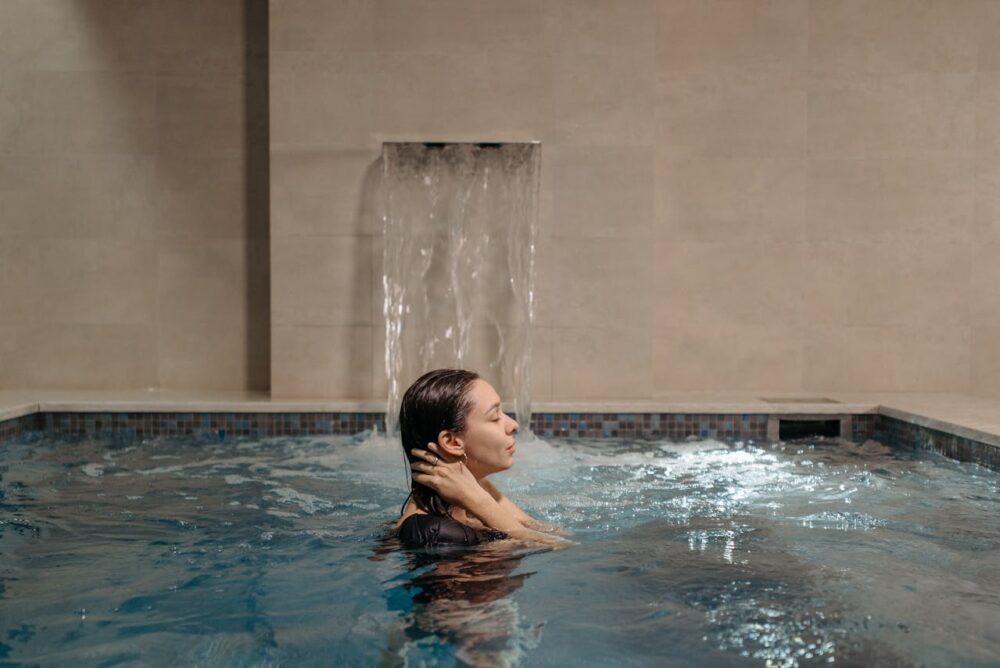How Water Can Help Alleviate Stress and Anxiety

In our fast-paced world, stress and anxiety have become unwelcome companions for many. From work pressures to personal challenges, these mental states can take a toll on our wellbeing. But what if a simple, everyday element could help ease these burdens?
While we often seek complex solutions to manage our mental health, sometimes the answer lies in the simplest of elements – water. This essential substance, which covers most of our planet and makes up a significant portion of our bodies, may offer more than just hydration. It turns out that water, in its various forms and uses, could be a powerful ally in our quest for mental calm and emotional balance.
In this article, we’ll explore the surprising ways water can help calm our minds and soothe our nerves. From its effects on our body chemistry to its role in relaxation techniques, we’ll dive into the refreshing world of water and discover how it can be a source of relief in our often turbulent lives.
Physiological Effects of Hydration on Stress
Our bodies are like complex machines, and just like any machine, they need the right fuel to run smoothly. Water is a crucial part of this fuel, playing a key role in how we handle stress.
When we don’t drink enough water, our bodies can go into a mild state of stress. This happens because dehydration, even in its early stages, can cause our cortisol levels to rise. Cortisol is often called the “stress hormone” because it’s released when we’re under pressure.
Here’s what happens:
- When we’re dehydrated, our blood volume decreases.
- This makes our heart work harder to pump blood around the body.
- The extra effort can trigger the release of stress hormones.
On the flip side, when we’re well-hydrated:
- Our blood flows more easily.
- Our hearts don’t have to work as hard.
- Our bodies are better equipped to handle stress.
Proper hydration also helps our brains function better. When we’re hydrated, we tend to think more clearly and react to stressful situations more calmly. It’s like giving our brains the best environment to work in, helping us stay cool under pressure.
Psychological Benefits of Drinking Water
Believe it or not, the simple act of drinking water can have a positive impact on our mental state. It’s not just about what the water does inside our bodies, but also about the act itself.
Mindfulness is a big buzzword these days, and for good reason. Being present in the moment can help reduce stress and anxiety.
Drinking water can be a simple mindfulness exercise:
- Take a moment to focus on the sensation of the cool water.
- Notice how it feels as you swallow.
- Pay attention to the refreshing feeling it brings.

This small act can serve as a mini-break from stressful thoughts, giving your mind a chance to reset.
Creating a routine around drinking water can also help. Routines provide structure and a sense of control, which can be comforting when life feels chaotic.
Try these ideas:
- Start your day with a glass of water.
- Use a water bottle with time markers to pace your drinking throughout the day.
- Take regular water breaks at work.
These routines not only keep you hydrated but also provide regular pauses in your day, offering moments of calm amidst the bustle.
Water-Based Relaxation Techniques
Water asides from being good for drinking, can also be a powerful tool for relaxation when used externally. This is where hydrotherapy comes into play. 
Hydrotherapy is the use of water for pain relief and treating various health conditions. But it’s also great for stress relief.
Here are some ways to try it:
- Take a warm bath: The heat helps relax tense muscles and can lower cortisol levels.
- Try contrast showers: Alternating between hot and cold water can improve circulation and give you an energy boost.
- Use a hot tub or jacuzzi: The combination of heat, buoyancy, and massage from the jets can be deeply relaxing.
For a more immersive experience, you might want to try a floating tank, also known as a sensory deprivation tank. 
Here’s what it involves:
- You float in a tank of water saturated with Epsom salt.
- The high salt content makes you extremely buoyant, so you float effortlessly.
- The tank is soundproof and dark, removing external stimuli.
- This environment allows your mind to enter a deeply relaxed state.
Many people report feeling calm and refreshed after a session in a floating tank. It’s like pressing a reset button for your stress levels.
The Calming Effects of Water Sounds
Have you ever noticed how peaceful you feel when listening to the sound of a babbling brook or ocean waves? It turns out there’s a scientific reason behind this calm feeling.
Natural water sounds can have a profound effect on our mental state:
- They often have a consistent rhythm, which our brains find soothing.
- The sounds are non-threatening, unlike sudden or harsh noises that might trigger our stress response.
- They can mask other, more irritating background noises.
Research has shown that listening to water sounds can:
- Lower heart rate and blood pressure
- Reduce levels of the stress hormone cortisol
- Improve mood and decrease anxiety
You don’t need to live near a beach or river to benefit from these effects. Many people use recordings of water sounds to help them relax:
- As background noise while working
- To aid meditation or yoga practice
- To help fall asleep at night
Some people even install small water features in their homes or offices to create a calming atmosphere. The gentle sound of flowing water can transform a space, making it feel more peaceful and relaxed.
Next time you’re feeling stressed, try putting on some ocean sounds or rainfall recordings. You might be surprised at how quickly it helps you relax.
Aquatic Exercise for Stress Relief
Exercise is a well-known stress-buster, but when you add water to the mix, the benefits can multiply. Aquatic exercises offer a unique combination of physical activity and the soothing properties of water.
Swimming is often called a meditative sport, and for good reason:
- The rhythmic nature of swimming strokes can induce a state of flow, helping to clear the mind.
- The sensation of being suspended in water can feel like floating away from your worries.
- The focus on breathing required in swimming can act as a form of mindfulness practice.
Regular swimmers often report lower levels of stress, anxiety, and depression. The physical benefits of swimming, such as improved cardiovascular health and muscle strength, can also contribute to overall well-being and stress resilience.
For those who aren’t keen on swimming laps, water aerobics offers another great option:
- The buoyancy of water reduces impact on joints, making it ideal for people with physical limitations.
- The resistance of water provides a full-body workout without the need for weights.
- Group classes can offer social interaction, which is beneficial for mental health.
Even simply moving in water can be therapeutic. The gentle pressure of water on your body can have a calming effect, almost like a constant, all-over hug.
Hydration’s Role in Sleep Quality
Good sleep is crucial for managing stress and anxiety, and proper hydration plays a key role in ensuring quality sleep.
Here’s how hydration affects your sleep:
- It prevents dehydration which can cause your mouth and nasal passages to become dry, leading to snoring and a less restful sleep.
- Being well-hydrated helps regulate your body temperature, which is important for good sleep.
- Proper hydration supports the production of melatonin, the hormone that regulates sleep.
However, timing is important. Drinking too much water right before bed can lead to nighttime trips to the bathroom, disrupting your sleep.
Here are some hydration tips for better sleep:
- Stay hydrated throughout the day, rather than trying to catch up at night.
- Have a small glass of water about an hour before bed.
- Keep a small glass of water by your bed in case you wake up thirsty.
A good sleep is a powerful stress-reducer. When you’re well-rested, you’re better equipped to handle daily stressors and less likely to experience anxiety.
Strategies for Incorporating Water in Stress Management
Now that we’ve explored the many ways water can help alleviate stress and anxiety, let’s look at some practical ways to incorporate these strategies into your daily life:
- Daily Hydration Strategies:
- Start your day with a glass of water. Place it by your bed before you go to sleep as a reminder.
- Use a marked water bottle to track your intake throughout the day.
- Set reminders on your phone to prompt regular water breaks.
- Flavour your water with fruits or herbs if you find plain water unappealing.
- Creating a Water-Friendly Environment:
- Set up a small fountain or water feature in your home or office. The sight and sound can be calming.
- Use a humidifier to add moisture to dry indoor air, which can be beneficial for both your body and mind.
- Keep plants that require regular watering. The act of caring for them can be meditative, and they improve air quality.
- Incorporating Water-Based Relaxation:
- Schedule a weekly bath as part of your self-care routine.
- Try a floating tank experience or look for hydrotherapy options in your area.
- Use water sounds (either from a real source or recordings) during meditation or work.
The key to winning with these strategies is consistency. Small, regular actions can lead to significant improvements in how you manage stress and anxiety over time. By making water a more prominent part of your daily routine, you’re not just staying hydrated, you’re giving yourself a powerful tool for mental well-being.
Conclusion
As we’ve explored throughout this article, water is more than just a basic necessity for survival, it’s a powerful tool for managing stress and anxiety in our daily lives. From the physiological benefits of proper hydration to the calming effects of water sounds and aquatic exercises, water offers a multitude of ways to find peace in our often chaotic world.
At AquaMaya, we see firsthand how access to clean water can transform lives and communities. Our work in West Africa isn’t just about providing a basic resource, it’s about opening doors to better health, reduced stress, and improved quality of life.
When we bring clean water to a community, we’re not just preventing waterborne diseases. We’re also:
- Reducing the stress of long, dangerous water collection journeys, particularly for women and children
- Alleviating anxiety about the safety of drinking water
- Providing opportunities for better sleep and overall health through proper hydration
- Creating spaces for community gathering and social support around water points
We are interested in seeing remarkable changes in the beneficiary communities. We want to see children who once spent hours collecting water now attending school regularly. Women who worried about their families falling ill from contaminated water now resting easier. These improvements in daily life will sure lead to significant reductions in stress and anxiety.
As you incorporate the water-based stress relief techniques we’ve discussed into your life, we invite you to think about those who lack access to clean water. By supporting organisations like AquaMaya, you’re not only helping to provide this essential resource, but you’re also contributing to stress reduction and improved mental health for entire communities.
Like we always say, every drop counts both in managing your own stress and in making a difference in the world. Whether it’s taking a moment to mindfully sip a glass of water or supporting clean water initiatives, you have the power to create ripples of positive change.
At AquaMaya, we’re committed to our mission of delivering clean water access to 10 million people in West Africa and reducing child mortality from waterborne diseases. We believe that access to clean water is not just about physical health but also about mental wellbeing. By joining us in this mission, you’ll not only be helping to quench thirst but also to alleviate stress and anxiety for millions.
Together, we can create a world where the stress-relieving benefits of water are available to all. Let’s make waves of change, one drop at a time.
Sources:
- https://www.healthline.com/nutrition/ways-to-lower-cortisol
- https://www.ncbi.nlm.nih.gov/books/NBK526077/
- https://my.clevelandclinic.org/health/treatments/23137-hydrotherapy
- https://bewell.stanford.edu/the-power-of-nature-2/
- https://www.healthline.com/nutrition/16-ways-relieve-stress-anxiety






